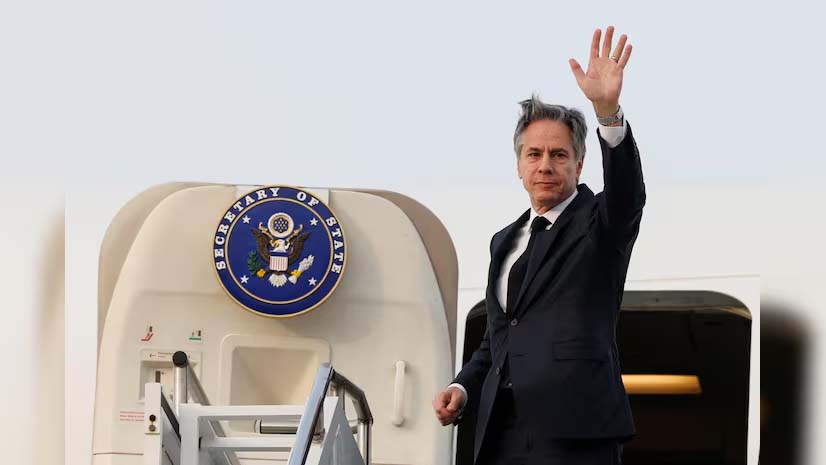Washington: On Sunday, US Secretary of State Antony Blinken initiated telephonic outreach to the foreign ministers of Jordan, Saudi Arabia, Turkey, and Egypt. Meanwhile, Defense Secretary Lloyd Austin engaged with his counterparts from Saudi Arabia and Israel, all in response to a worsening crisis in the Middle East following Iran’s aggressive action against Israel.
Iran launched over 300 drones and missiles towards Israel, claiming this was a retaliation for the April 1 strike on its consulate in Syria. Israeli, US, and allied forces intercepted nearly all of these Iranian projectiles before they could hit their intended targets.
The diplomatic scramble to contain the crisis followed a conference call between US President Joe Biden and G-7 leaders, as well as individual conversations with Jordan’s King Abdullah and Israeli Prime Minister Benjamin Netanyahu. The central message conveyed by US leadership was the urgency to avoid further conflict escalation in the region and a reaffirmation of the United States’ unwavering commitment to Israel’s security.
Emphasizing diplomatic avenues, the US State Department spokesperson, Matthew Miller, highlighted the need for a sustainable resolution in Gaza that ensures lasting peace and security for both Israelis and Palestinians. Blinken’s discussions with Jordan’s Deputy Prime Minister and Minister of Foreign Affairs and Expatriates Ayman Safadi, Egyptian Foreign Minister Sameh Shoukry, and Turkish Foreign Minister Hakan Fidan focused on these issues.
Blinken expressed gratitude to Fidan for Turkey’s proactive efforts to curb regional escalation. Conversations with Shoukry centered around humanitarian support to Gaza, civilian safety, and establishing an immediate ceasefire to facilitate the release of hostages.
Thanking Jordan for its leadership in delivering vital aid to Palestinian civilians, including through collaborative US-Jordan airdrops and overland transfers, Miller acknowledged Jordan’s crucial role. In talks with Saudi Arabian Foreign Minister Prince Faisal bin Farhan Al-Saud, Blinken emphasized the US’s stance against escalation while pledging continued support for Israel’s self-defense. The pair agreed on the necessity of a harmonized diplomatic approach.
Pentagon Press Secretary Maj. Gen. Pat Ryder noted Austin’s discussion with Saudi Minister of Defense, Khalid bin Salman, reaffirming that the US seeks to avoid escalation while pledging to protect Israel and US personnel. Austin stressed the long-standing defense partnership with Saudi Arabia and reiterated the US’s dedication to deescalate regional tensions.
Austin also briefed Gallant on his conversations with international partners and allies to fortify global determination in the face of Iranian hostility. Concurrently, President Biden engaged with Congressional leaders regarding what stands as the most significant foreign policy challenge of his tenure.
Biden convened a call with Senate Majority Leader Chuck Schumer, Senate Minority Leader Mitch McConnell, Speaker of the House Mike Johnson, and House Minority Leader Hakeem Jeffries to discuss Iran’s unprecedented assault on Israel. The President emphasized the pressing need for the House of Representatives to swiftly pass the national security supplemental, per the White House.
At the UN headquarters in New York, UN Secretary-General Antonio Guterres addressed the Security Council during an emergency session, stressing the necessity of avoiding actions that could spark large-scale military confrontations across the Middle East.
Guterres highlighted that regional and global stability are deteriorating rapidly, and neither the region nor the world can afford further conflict. Schumer denounced Iran’s growing isolation due to its “malevolent” conduct, noting the importance of quickly passing the supplemental to bolster Israel’s anti-missile and anti-drone capabilities.
White House National Security Communications Advisor John Kirby appeared on various news programs, emphasizing the United States’ unbreakable commitment to safeguarding Israel. He made clear that the US does not seek a confrontation with Iran.
Kirby lauded the remarkable achievement of the Israeli military in neutralizing hundreds of drones and missiles, asserting that this success attests to both Israeli and US military excellence and the significant resources President Biden allocated to Israel’s defense.
Kirby praised the exceptional display of military prowess by Israel, asserting that the nation’s resilience and its strong international alliances showcase its status on the global stage. Kirby stated on NBC News that while the US supports Israel’s defense, the decision on how and when to respond rests with Israel. He reiterated the US’s desire to avoid a war with Iran and averted escalation.




